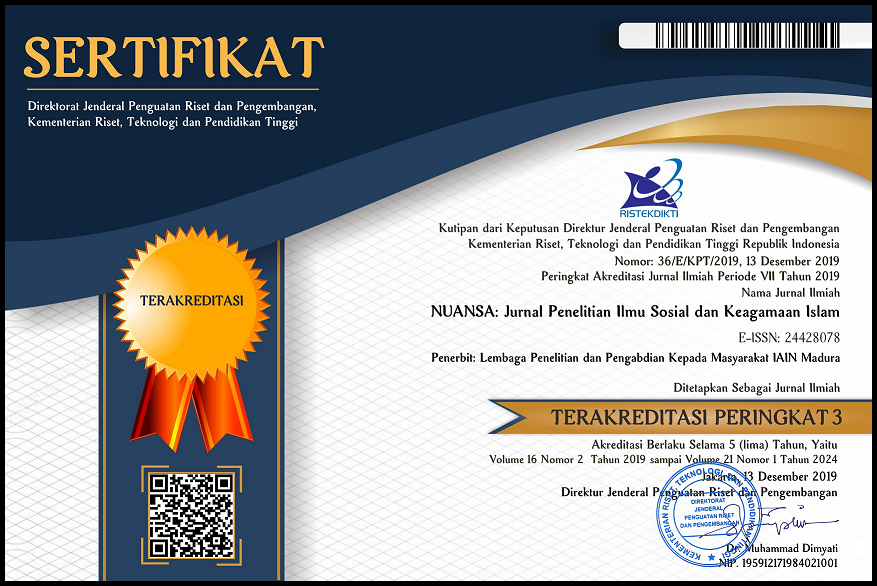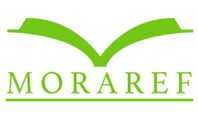Pencarian Kembali Moderasi Beragama Dalam Kitab Itḥāf Al-Dhaki
 Abstract views: 321
,
Abstract views: 321
,
 pdf downloads: 245
pdf downloads: 245
Abstract
This article explores the concept of religious moderation in the Kitab Itḥāf al-Dhaki and its relevance in contemporary Indonesian Islam. As a new national policy, religious moderation is open to criticism for conceptual establishment. This policy aims for addressing the threat of religious extremism and intolerance in Indonesia which has become more active over the past two decades. Also, have been a move to curb the political exploitation of religion which has led to identity politics and hate speech flourishing in the 2019 elections. By using a qualitative type of research based on a literature study, i.e. the Kitab Ithaf al-Dhaki, this article results that remaking of religious moderation in this manuscript is accommodating two streams of thought is more important than choosing one of them, as long as it can be done. The meaning of moderation according to Ibrahim al-Kurani, author of the Kitab Ithaf al-Dhaki, is a someone who can combine the two meanings of the Qur'an both esoteric and exoteric (i.e., a perfect man or insan kamil). Furthermore, Al-Kurani in Kitab Itḥāf al-Dhaki argues to be moderate, one should be understand both (esoteric and exoteric) thoughts. It's impossible to moderate if you don't know the two streams of thought..
(Artikel ini mengeksplorasi konsep moderasi beragama dalam Kitab Itḥāf al-Dhaki dan relevansinya bagi Islam Indonesia kontemporer. Sebagai kebijakan nasional baru, moderasi beragama terbuka untuk dikritisi demi pematangan konseptual. Terlebih, tujuan dari moderasi beragama adalah untuk mengatasi ancaman ekstremisme dan intoleransi agama di Indonesia yang semakin aktif selama dua dekade terakhir. Selain itu, juga merupakan langkah untuk mengekang eksploitasi politik agama yang telah menyebabkan politik identitas dan ujaran kebencian berkembang dalam pemilu 2019 silam. Dengan menggunakan jenis penelitian kualitatif berbasis studi pustaka, artikel ini menghasilkan temuan bahwa pencarian kembali moderasi beragama dalam manuskrip ini adalah mengakomodir dua aliran pemikiran berseberangan daripada memilih salah satunya, dengan syarat memahami betul kedua aliran pemikiran tersebut. Makna moderasi menurut Ibrahim al-Kurani adalah seseorang yang dapat memadukan dua makna al-Qur’an, baik yang esoteris maupun yang eksoteris (itulah manusia yang sempurna/insan kamil). Lebih lanjut, Al-Kurani dalam Itḥāf al-Dhaki berpendapat untuk menjadi moderat, seseorang harus memahami kedua pemikiran (esoteris dan eksoteris). Tidak mungkin memoderasi jika orang tersebut tidak mengetahui dua aliran pemikiran). Dalam konteks ini, pencarian jati diri moderasi beragama melalui Ithaf al-Dhaki menjadi keniscayaan demi kedewasaan beragama di Islam Indonesia kontemporer.)
Downloads
References
Amin, Kamaruddin. “Sambutan Direktur Jenderal Pendidikan Islam,” in Moderasi Beragama; Dari Indonesia untuk Dunia. Yogyakarta: LKiS, 2019.
Azra, Azyumardi. Jaringan Ulama Timur Tengah dan Kepulauan Nusantara Abad XVII dan XVIII. Bandung: Penerbit Mizan, second edition, 1994.
Azra, Azyumardi. Jaringan Ulama Timur Tengah dan Kepulauan Nusantara Abad XVII dan XVIII. Jakarta: Prenada Media, 2013.
Azra, Azyumardi. The Origins of Islamic Reformism in Southeast Asia: Networks of Indonesian-Malay and Middle Eastern ‘Ulama’ in the Seventeenth and Eighteenth Century. Australia & Honolulu: Allen & Unwin and University of Hawai’i Press, 2004.
Cole, Juan. Muhammad: Juru Damai di Tengah Benturan Imperium Besar Dunia. Jakarta: Pustaka Alvabet, 2019.
Creswell, John W., and J. David Creswell. Research design: Qualitative, quantitative, and mixed methods approaches. Sage publications, 2017.
Cole, Juan. Muhammad: Prophet of Peace Amid the Clash of Empires. Hachette UK, 2018.
Fathurahman, Oman. "Itḥāf al-Dhakī by Ibrāhīm al-Kūrānī: A Commentary of Waḥdat al-Wujūd for Jāwī Audiences." Archipel 81.1 (2011): 179-180.
Fathurahman, Oman. Ithaf al-dhaki: tafsir wahdatul wujud bagi Muslim Nusantara. Bandung: Mizan Publika, 2012.
Fathurahman, Oman. "Uṣūl al-Madhāhib al-Ṣūfīyah al-Muḥaddathah bi Indūnīsīyā: Mulāhaẓat ‘alā Kitāb Itḥāf al-Dhākī li al-Shaykh Ibrāhīm al-Kurānī." Studia Islamika 9.1 (2002).
Fathurahman, Oman. "Further research on Itḥāf al-dhakīmanuscripts by Ibrāhīm al-Kūrānī." From Codicology to Technology: Islamic Manuscripts and their Place in Scholarship (2009): 47-58.
Fonseca, Xavier, Stephan Lukosch, and Frances Brazier. "Social cohesion revisited: a new definition and how to characterize it." Innovation: The European Journal of Social Science Research 32.2 (2019): 231-253.
Gofman, Alexander. "Durkheim’s theory of social solidarity and social rules." The Palgrave Handbook of Altruism, Morality, and Social Solidarity. Palgrave Macmillan, New York, 2014.
Hasyim, Syafiq. “2021/149 “Jokowi’s Moderasi Beragama: Challenge and Opportunity” by Syafiq Hasyim “, dalam https://www.iseas.edu.sg/articles-commentaries/iseas-perspective/2021-149-jokowis-moderasi-beragama-challenge-and-opportunity-by-syafiq-hasyim/, diakses 29 Maret 2022.
Hefni, Wildani. "Moderasi beragama dalam ruang digital: Studi pengarusutamaan moderasi beragama di perguruan tinggi keagamaan Islam negeri." Jurnal Bimas Islam 13.1 (2020): 1-22.
Hilmy, Masdar. "Whither Indonesia’s Islamic moderatism?; a reexamination on the moderate vision of Muhammadiyah and NU." Journal of Indonesian Islam 7.1 (2013): 42-43.
Hilmy, Masdar. Jalan Demokrasi Kita; Etika Politik, Rasionalitas dan Kesalehan Publik. Malang: Intrans Publishing, 2017.
Hilmy, Masdar. Islam Profetik: Substansiasi Nilai-nilai Agama dalam Ruang Publik. Yogyakarta: Kanisius, 2008.
Irham, Muhammad Aqil. "The Idea of Religious Moderation In Indonesian New Order And The Reform Era." Ilmu Ushuluddin 8.1 (2021): 1-22.
Kementerian Agama RI. “Jadi Menag, Gus Yaqut: Agama Harus Jadi Inspirasi, Bukan Aspirasi” dalam https://kemenag.go.id/read/jadi-menag-gus-yaqut-agama-harus-jadi-inspirasi-bukan-aspirasi-egqa0, diakses 29 Maret 2022.
Miles, Matthew B., A. Michael Huberman, and Johnny Saldaña. Qualitative data analysis: A methods sourcebook. Sage publications, 2018.
Nafi, Basheer M. "Taṣawwuf and reform in pre-modern Islamic culture: In search of Ibrāhīm al-Kūrānī." Die Welt des Islams (2002): 330.
Prasetia, Senata Adi, et al., "Epistemic Rationality In Islamic Education: The Significance for Religious Moderation in Contemporary Indonesian Islam," Ulul Albab 22.2 (2021): 232.
Prasetia, Senata Adi. Epistemologi rasional dalam pendidikan Islam: studi komparasi pemikiran Muhammad Abid al Jabiri dan Mohammed Arkoun. Master thesis, UIN Sunan Ampel Surabaya, 2022.
Prasetia, Senata Adi. "Reorientasi, peran dan tantangan pendidikan Islam di tengah pandemi." Tarbawi 9.1 (2020): 21-37.
Prasetia, Senata Adi. “Belajar Moderasi Beragama dari Kitab Ithaf Al Dzaki, Kitab Tafsir Ulama Nusantara” dalam https://bincangsyariah.com/kalam/belajar-moderasi-beragama-dari-kitab-ithaf-al-dzaki-kitab-tafsir-ulama-nusantara/, diakses 29 Maret 2022.
Senata, Adi Prasetia, et al. "Epistemic Rationality In Islamic Education: The Significance for Religious Moderation in Contemporary Indonesian Islam." Ulul Albab 22.2 (2021): 232.
Siroj, Said Aqil. Tasawuf sebagai kritik sosial: mengedepankan Islam sebagai inspirasi, bukan aspirasi. Bandung: Mizan Pustaka, 2006.
Qoumas, Yaqut C. Preface in Religious Moderation. Jakarta: Badan Litbang dan Diklat Kementerian Agama RI, 2021.
Rahman, Fazlur. Islam and Modernity: Transformation of an Intellectual Tradition. Chicago: Chicago University Press, 1984.
Zamzam, Zafry. Syekh Muhammad Arsyad Al-Banjary sebagai Ulama Juru Da’wah dalam Sejarah Penyiaran Islam di Kalimantan Abad 13 H/18 M dan Pengaruhnya di Asia Tenggara. Banjarmasin: Penerbit Karya, 1979.
The journal operates an Open Access policy under a Creative Commons Attribution-NonCommercial 4.0 International License (CC-BY-NC) 
Authors who publish with this journal agree to the following terms:
- Authors retain copyright and grant the journal right of first publication with the work simultaneously licensed under a Creative Commons Attribution License that allows others to share the work with an acknowledgement of the work's authorship and initial publication in this journal.
- Authors are able to enter into separate, additional contractual arrangements for the non-exclusive distribution of the journal's published version of the work (e.g., post it to an institutional repository or publish it in a book), with an acknowledgement of its initial publication in this journal.
- Authors are permitted and encouraged to post their work online (e.g., in institutional repositories or on their website) prior to and during the submission process, as it can lead to productive exchanges, as well as earlier and greater citation of published work.





















